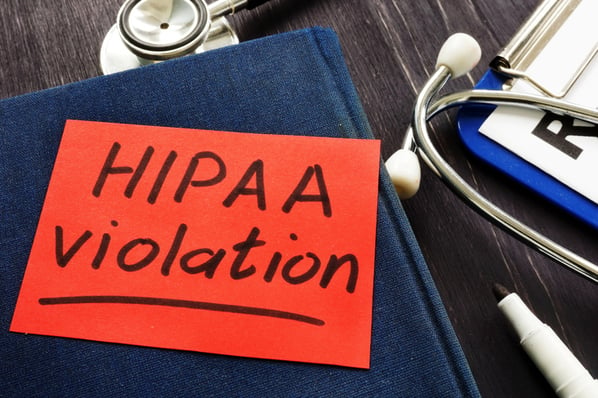In a busy practice, the day can feel like it’s running you instead of the other way around. When...


HIPAA compliance represents a cornerstone of privacy and security in the healthcare sector, safeguarding patient information, ensuring data security, and building a strong foundation of trust between patients and healthcare providers. For healthcare organizations and their business associates, adhering to HIPAA's regulations is not just about fulfilling legal requirements; it's about embracing an ethical responsibility to protect sensitive personal health information (PHI).
This commitment to compliance helps prevent costly data breaches, avoids significant legal penalties, and maintains the viability of healthcare businesses in a competitive market. Through rigorous safeguards and a comprehensive approach to patient data protection, HIPAA compliance underscores the critical importance of confidentiality and trust in the effective delivery of healthcare services.
The Health Insurance Portability and Accountability Act (HIPAA) was passed in August of 1996. This act set the national standard in terms of privacy for sensitive health information.
The three main goals of HIPAA are to:
|
3 Categories of HIPAA Violations |
||
|
Administrative |
Civil |
Criminal |
|
Usually unintentional and a result of a lack of proper policies and procedures. |
Can be intentional or unintentional and typically involves negligence or recklessness. These violations can lead to financial repercussions. |
Intentional and involve a willful disregard of HIPAA regulations. Fines or imprisonment may result. |
|
These violations are investigated by the Centers for Medicare and Medicaid Services. |
Either the Department of Health and Human Services (HHS) Office for Civil Rights (OCR) investigates these violations. |
Department of Justice will pursue an investigation and any charges for these violations. |
HIPAA Violations can have a significant impact on both patients and healthcare providers. For the patient, private health information that is provided to the wrong people can have an impact on their career or financial status, among other things.
For the organization, the legal and financial repercussions can be much greater. Discovery of a HIPAA violation can lead to significant settlement amounts, court costs, and - in the case of criminal violations - charges and the sentences that result from a guilty verdict.
For more information on situations involving HIPAA, social media, and how to avoid similar issues at your medical practice, consider these resources:
HIPAA compliance is not just a legal requirement but a comprehensive approach to ensuring the privacy and security of patient information, maintaining trust in the healthcare system, avoiding financial and legal repercussions, and fulfilling both ethical and business responsibilities. Compliance strengthens the healthcare ecosystem, ensuring that patient care and privacy remain paramount. Since HIPAA was passed, several common violations have become noteworthy.
We will discuss 9 of those violations in depth:
Unauthorized access/disclosure
Lack of employee training
Failure to report incidents promptly
Improper disposal of PHI
Lack of adequate safeguards
Lack of patient access to their health information
Failure to conduct risk assessments
Hacking/IT incidents
Non-compliance with the HIPAA privacy rule
The unauthorized access or disclosure of PHI occurs when information is given to individuals who may know the patient but are not listed as approved information recipients in the patient’s file. These individuals can be family, friends, co-workers, or anyone who claims a relationship with the patient but is not approved by the patient to access their private information.
Avoiding this type of access is something that should be taught early and reminders issued often. Implement strict access controls and employee training programs to ensure that patient information is only given to those who are approved to obtain it.
HIPAA training for all employees is a requirement as part of the HIPAA law. Employees who need help understanding the full scope of HIPAA are more likely to make mistakes unintentionally. 
It is important to cover not only the basics of HIPAA in these training sessions but also cybersecurity best practices and any policies and procedures your organization has in place that relate to these topics.
Organizations must have an effective incident response plan to address any potential breaches of PHI. Failing to promptly identify, respond to, and report breaches, as required by HIPAA, can exacerbate the situation and lead to larger fines.
Improper disposal of PHI can lead to unauthorized access. PHI should be disposed of securely and in a manner that prevents reconstruction, such as shredding paper records or securely wiping electronic media.
Encryption is a critical safeguard for protecting ePHI, especially when it is stored on portable devices or transmitted over the internet. If an organization fails to encrypt ePHI, it is at risk of a breach if the information is intercepted or if the device is lost or stolen.
Also, without proper access controls, unauthorized individuals could gain access to PHI. This includes both physical access to areas where PHI is stored and electronic access to systems housing ePHI. Access controls should ensure that only those who need to view PHI for their job function can do so.
Per HIPAA regulations, patients have the right to access their records within a 30-day window of the request to do so. They also have the right to have copies made of some of those records. Violations of their rights can have consequences.
Create clear, efficient procedures for patient information requests to ensure these requests are not overlooked and are handled promptly.
Risk assessments should be done regularly to identify vulnerabilities. Threats to information that is stored online are continually changing, and the vulnerabilities may not become apparent until a new threat is looming.
All agencies that handle patient records should perform regular and thorough risk analyses of all systems handling PHI. With a regular schedule in place, it is more difficult to skip the process and therefore put that information at risk.
Several HIPAA-related settlements have occurred because organizations failed to execute organization-wide assessments, each with a multi-figure payout.
 Data breaches allow patient information to be accessed by individuals who intend to use it in harmful ways. Proper encryption, the use of passwords, and other security measures are an important first step to protecting that information, but devices can still be lost and hackers can figure out passwords in some situations.
Data breaches allow patient information to be accessed by individuals who intend to use it in harmful ways. Proper encryption, the use of passwords, and other security measures are an important first step to protecting that information, but devices can still be lost and hackers can figure out passwords in some situations.
For this reason, it is wise to strengthen IT security measures and monitor systems for unauthorized access.
Not having proper patient consent forms or failing to enter into Business Associate Agreements can put patient information at risk. Understanding the process of protecting patient information is an important part of HIPAA.
The best way to make sure this does not occur is to regularly review and adhere to the Privacy Rule's standards.
The consequences of HIPAA violations can be severe, including hefty fines, legal action, and damage to an organization's reputation. To avoid such outcomes, it is essential for organizations handling PHI to implement comprehensive safeguards, conduct regular training and risk assessments, and ensure compliance across all operations involving patient data.
Creating a HIPAA compliance plan is essential for any medical practice to ensure the protection of patient information and adherence to legal standards. For a medical practice in Texas, here's a comprehensive plan to achieve HIPAA compliance:
Research and Training: Begin by thoroughly researching HIPAA regulations, focusing on the Privacy Rule, the Security Rule, and the Breach Notification Rule. Conduct training sessions for all staff members, including physicians, nurses, administrative staff, and other employees handling protected health information (PHI).
Designate a Compliance Officer: Appoint a HIPAA Compliance Officer responsible for overseeing compliance efforts, managing training programs, and serving as a point of contact for any HIPAA-related issues.
Identify and Analyze Risks: Perform a comprehensive risk assessment to identify potential vulnerabilities to the confidentiality, integrity, and availability of electronic PHI (ePHI). This should cover all electronic devices, data storage solutions, and communication channels used by the practice.
Document and Prioritize Risks: Document all identified risks and categorize them based on their threat level. Develop a prioritized plan for addressing these risks, focusing on the most critical vulnerabilities first.
Identify Necessary Physical Safeguards: Establish physical safeguards to protect PHI. This may include secure locks on file cabinets and doors, surveillance cameras, and secure areas for computer servers.
Establish Technical Safeguards: Implement technical safeguards such as encryption, secure access controls, and audit controls to ensure that only authorized personnel can access ePHI. Regularly update software and systems to protect against cyber threats.
Prioritize Administrative Safeguards: Develop policies and procedures for managing the selection and training of employees, emergency access procedures, and the evaluation of security practices. Ensure that all staff members are aware of their roles in protecting patient information.
Develop Compliance Documents: Draft clear and detailed policies and procedures covering all aspects of HIPAA compliance, including patient rights, data protection practices, breach notification procedures, and employee training requirements. Regularly review and update these policies and procedures to reflect changes in HIPAA regulations, technological advancements, and new security threats.
Conduct Regular Training: Organize ongoing training sessions for all staff members to ensure they understand HIPAA requirements and the practice's policies and procedures. Include scenario-based training to help staff apply policies in real-world situations.
Monitor and Audit: Implement a system for regularly monitoring and auditing compliance with HIPAA regulations and the practice’s policies. This includes conducting periodic risk assessments, tracking access to PHI, and investigating any incidents of non-compliance.
By following these steps, a medical practice in Texas can establish a robust HIPAA compliance plan, ensuring the protection of patient information and adherence to legal and regulatory standards. Regular review and adjustment of the compliance plan are essential to address emerging threats and changes in technology or regulations.
The journey towards HIPAA compliance is a vital pathway for healthcare providers and their business associates to navigate, underscoring the profound importance of protecting patient privacy and ensuring data security. This endeavor goes beyond merely adhering to regulatory mandates; it embodies an ethical commitment to uphold the dignity and confidentiality of patient information, which is foundational to the trust placed in the healthcare system.
The essence of HIPAA compliance is intricately linked with the quality and integrity of healthcare delivery, reinforcing that the protection of sensitive health information is not just a regulatory requirement but a cornerstone of ethical healthcare practice. By embracing a culture of compliance, healthcare organizations can ensure they not only meet legal standards but also fortify the trust and confidence of their patients, thereby contributing to a more secure and trustworthy healthcare ecosystem.


In a busy practice, the day can feel like it’s running you instead of the other way around. When...

Getting a Texas physician license can feel like a test of patience long before you ever see a...

Running a private practice already demands enough from you. Adding hours of administrative work on...

Running a medical practice involves managing dozens of ongoing costs, and understanding them is...

A Texas physician opened a new practice with everything in place – staff hired, patients scheduled,...

Your biller is three weeks behind on claims. Two no-shows went unfilled this morning. Your office...

Every minute spent chasing paperwork or fixing scheduling issues is time taken away from patients....

Most physicians didn’t go through years of training to become billing experts, HR managers, or IT...

If your medical practice overhead seems to be eating into your revenue, you’re not alone. Research...

Marketing and referral strategies are part of running a private practice. In Texas, they come with...
Leave a Comment